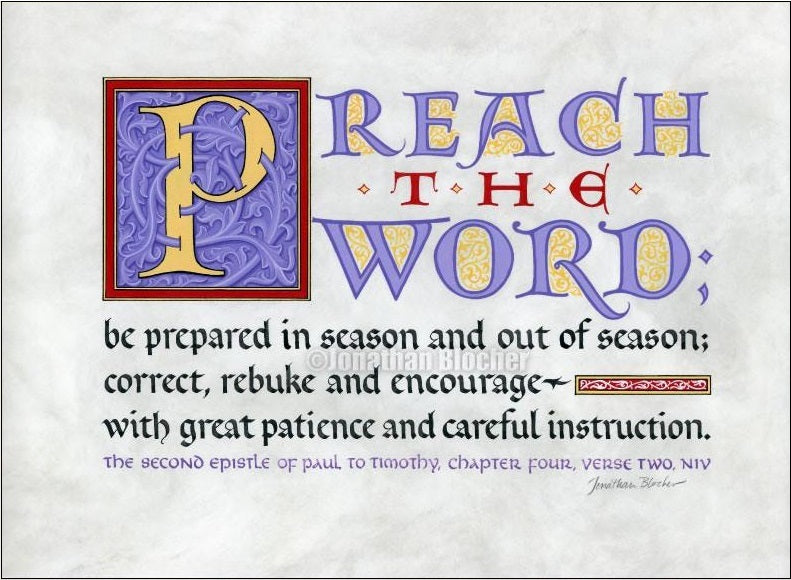When the three year lectionary was introduced, part of the impetus was to expose people to a broader perspective of Scripture. It was and is a laudable goal. While some texts were chosen either because of the lectio continua (as in the case of Epistles) and some were simply different accounts of the same miracles, sermons, or teaching of Jesus, others were chosen because of the world in which we live. In a less than salutary way, this might mean political and social movements to be addressed. In the Revised Common Lectionary this is more of a problem than it is in the version in Lutheran Service Book. However, it is not the calendar that has shifted the doctrinal preaching to textual exposition. It is the perspective of the preacher and the hearer that has reduced the doctrinal content of what goes forth from the pulpit. This has had disastrous consequences in the life of the Church.
I would posit the thesis that the reason why the people in conservative churches are also enticed by the gender, sexual desire, equity, justice, inclusiveness, and climate debates of our age is because we have not preached doctrinally. To preach doctrinally is to approach the texts in terms of doctrine. It is not simply what the text says but what it teaches. This does not put any constraint upon the text nor does it impose any blinders upon the preacher. It simply asks the question: What is our Lord teaching here? The doctrines of the Church are not subject to change even though they are certainly ever being applied and sharpened upon the iron of challenge and controversy. The question can never be what is Jesus saying to us today but what did Jesus say and still says and how does this impact what we believe and how we then live?
If we have problems with such things as closed communion, for example, it is because we have suffered a dearth of real doctrinal preaching on the Sacrament of the Altar. The texts of both the historic and three year lectionary offer us ample opportunity to address this so we cannot fault either for this. We can only fault ourselves as preachers and as hearers. We are less interested in doctrine and it shows. When the faithful positions of the Church are affirmed by a nominal majority in convention or passed overwhelmingly only to be ignored in practice, part of the reason has to be that we have not preached the Word as we should. We have not preached doctrinally.
Jesus has said nothing for a moment that He has not said for eternity. His Word endures forever -- every jot and tittle. His Word is not new because it has never been said before but because it is the Word of life that speaks life to our death and hope to our despair. We do not make that Word new but the Spirit does. When we speak that Word faithfully and address the hearers with what the Lord teaches in that Word, the Church is built up and the hearer edified. More than this, we are equipped to stand upon the Word amid the challenges and disputes of culture, society, and even government. Without this, the Word of Jesus is merely a momentary voice that has no roots in the past or power to address the future. It is captive to the moment and so powerless to address us except in the realm of our feelings. When the preacher approaches the text asking what is Jesus saying to us today, doctrine is cast aside in favor of novelty. Strange, given that the Lord insists His Words are not His but the Fathers and the Spirit insists the only agenda at work is to bring to our recollection what our Lord said. We strive for novelty while the Lord is working toward consistency and constancy. This is the realm of doctrine and it is the fruit of doctrinal preaching.
I hope and pray that we as preachers remember that we are not approaching a new text looking for a new way of preaching it but addressing the familiar words of Scripture, hearing the familiar voice of the Good Shepherd, and preaching the faith that does not change but will always endure. Our people deserve such attentiveness to doctrine so that they may be rooted and planted in the Word of God and not left without anchor amid the winds of change and chance. This is how what happens in the Divine Service is catechesis as well as the service of God's gifts to His people. They happen at the very same time.
The charge laid against the evangelical preachers of today as well as the moralistic preachers of today and other eras is not what was said only but what was not said. To preach as the Osteens of the age preach or to preach moralistic sermons that are about behavior is to strip the text of doctrine and to make it about me and what I am doing and what I am feeling in the moment. Worse, it is to deprive the people of God with the anchor in His Word and truth and to leave them exposed to the exploitation of wolves within the flock as well as the enemies without. To preach the faith is to preach doctrine.

No comments:
Post a Comment